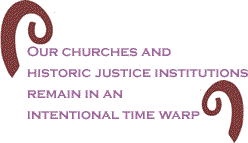Last
week, Martin Luther King tributes were taking place across
the nation. And the spirit of MLK and the courageous acts
of our foremothers and forefathers of the civil rights movement
are etched indelibly in many of our hearts.
 But
the civil rights movement of Martin Luther King’s
era of the 1960’s, many would say, is dying a slow
and necessary death. But
the civil rights movement of Martin Luther King’s
era of the 1960’s, many would say, is dying a slow
and necessary death.
And for many African
Americans of younger generations, who are now the beneficiaries
of the racial gains from the Movement, feeling the Movement’s’
slow death is like a welcoming boulder gradually being lifted
from their shoulders, especially for those who are lesbian,
gay, bisexual, transgender and queer.
With many key African
American organizations and institutions of the civil rights
movement of the 1960’s still resistant to address
this generation’s outwardness about their sexual orientations
and gender expressions as a civil rights issues, these organizations
and institutions have not only lost their mantle as part
of a prophetic justice movement for this day and age, but
many of our present day key African American organizations
and institutions of the Movement have also lost the moral
high ground that was once so easily associated with them.
For example, the bedrock
institution in the African American community, we all know
by now, is the Black church. And it was also the bedrock
of the civil rights movement. In March of 2010, African
American Princeton’s Eddie Glaude Jr. published an obituary for the black church in the Huffington Post titled,
“The Black Church is Dead.” Glaude talked about
several of the problems facing the African American community,
but no where in his piece did he talk about anti-gay ministers
and homophobic congregrations.
According to the PEW
Research Center’s
Forum on Religion and Public Life, 87 percent of African
Americans identify with a religious group and 79 percent
say that religion is very important in their lives. The
Pew report also showed that since 2008, African-American
Protestants are less likely than other Protestant groups
to believe that LGBTQ people should have equal rights. And
since hot-button issues like gay adoption and marriage equality
have become more prominent, support for LGBTQ rights among
African-American Protestants has dipped as low as 40 percent.
 A
groundbreaking study in July 2010 came out titled, “Black
Lesbians Matter” examining the unique experiences,
perspectives, and priorities of the Black Lesbian Bisexual
and Trans community. One of the key findings of the survey
revealed that there is a pattern of higher suicide rates
among black LBTs. Scholars have primarily associated these
higher suicide rates with one’s inability to deal
with “coming out” and the Black
Church’s stance on homosexuality. A
groundbreaking study in July 2010 came out titled, “Black
Lesbians Matter” examining the unique experiences,
perspectives, and priorities of the Black Lesbian Bisexual
and Trans community. One of the key findings of the survey
revealed that there is a pattern of higher suicide rates
among black LBTs. Scholars have primarily associated these
higher suicide rates with one’s inability to deal
with “coming out” and the Black
Church’s stance on homosexuality.
But with various pockets
within a community homophobic, clerics closeted and a church
on the “down-low” about sexuality it cannot
save itself from itself. And perhaps as many of us LGBTQ
Christians in the Black Church
have known but Glaude finally stated it: “The Black Church is Dead.”
But with a dead church
so, too, will follow important historic organizations that
were birthed out of the civil rights movement and headed
by black homophobic ministers.
One example is the Southern
Christian Leadership Conference (SCLC).
“We should’ve
closed it down years ago,’’ Andrew Young, who
worked alongside Martin Luther King Jr., said after Rev.
Bernice King announced to the Atlanta Journal Constitution
this week that she will not be taking her oath as SCLC’s
president. “I saw this as a lost cause a long time
ago.’’
But many in the LGBTQ
community felt, with Rev, Bernice King at the helm of the
organization, queer justice was certain to be a lost cause.

In 2009, Rev. Bernice
King was bestowed the honor to be the eighth president and
first women to head SCLC, co-founded by her father, Rev.
Dr. Martin Luther King, Jr. While it isn’t clear if
Bernice King was a legacy pick for SCLC, it is, however,
very clear to many of us in our LGBTQ communities that she
would not be carrying out her father’s legacy.
And having been rumored
for years, on the “chitlin’ circuit,”
to be a lesbian, her track record concerning LGBTQ civil
rights has been less than humane and antithetical to the
legacies of both her parents.
For example, Rev. Bernice
King’s most audacious sign of desecrating her father’s
legacy was the December 2004 march titled, “Stop the
Silence,” promoting an anti-gay agenda.
Beginning the protest
march by lighting a torch at her father’s grave site
and then passing it on to her spiritual mentor and the march
organizer, Bishop Eddie Long of New Birth Missionary Baptist
Church, who has recently been embroiled in a sex scandal
for molesting pubescent boys from his church, whom he calls
“spiritual sons,” King stated that “I
know in my sanctified soul that he (Dr. King) did not take
a bullet for same-sex marriage.” Therefore, given
the homophobic vitriol Rev. Bernice King has spewed out
over the years, the LGBTQ community is always braced to
see what next she’ll say and do, and especially if
given the bully pulpit she would have had as president of
SCLC.
 Comprised
mostly of conservative clergy and parishioners, our churches
and historic justice institutions remain in an intentional
time warp. With its refusal to speak on present-day issues
not only plaguing the African American community but plaguing
all Americans, these churches and organizations exist as
a visiting museum tethered to the 1960’s civil rights
era rather than exist as an organization faced toward the
challenges of today. Comprised
mostly of conservative clergy and parishioners, our churches
and historic justice institutions remain in an intentional
time warp. With its refusal to speak on present-day issues
not only plaguing the African American community but plaguing
all Americans, these churches and organizations exist as
a visiting museum tethered to the 1960’s civil rights
era rather than exist as an organization faced toward the
challenges of today.
Like the many who gathered
last week to commemorate Martin Luther King Day, I, too,
am committed to the teachings of Martin Luther King, Jr.
I not only miss King’s
wisdom, I miss the sound of his voice, the things he said
with that voice, and the choir that resounded within him
with that voice.
King once told a racially-mixed
audience that “Eventually the civil rights movement
will have contributed infinitely more to the nation than
the eradication of racial injustice.”
If King were alive today
he would want us to look at homophobia.
BlackCommentator.com
Editorial Board member, the Rev. Irene Monroe, is a religion
columnist, theologian, and public speaker. She is the Coordinator of
the African-American Roundtable of the Center for Lesbian and
Gay Studies in Religion and Ministry (CLGS) at the Pacific
School of Religion.
A native of Brooklyn,
Rev. Monroe is a graduate from Wellesley College and Union
Theological Seminary at Columbia University, and served
as a pastor at an African-American church before coming
to Harvard Divinity School for her doctorate as a Ford Fellow.
She was recently named to MSNBC’s list of 10 Black Women You Should Know. Reverend Monroe is the author
of Let Your Light Shine Like a Rainbow Always: Meditations on Bible
Prayers for Not’So’Everyday Moments.
As an African-American feminist theologian, she speaks for
a sector of society that is frequently invisible. Her website
is irenemonroe.com.
Click here
to contact the Rev. Monroe.

|

